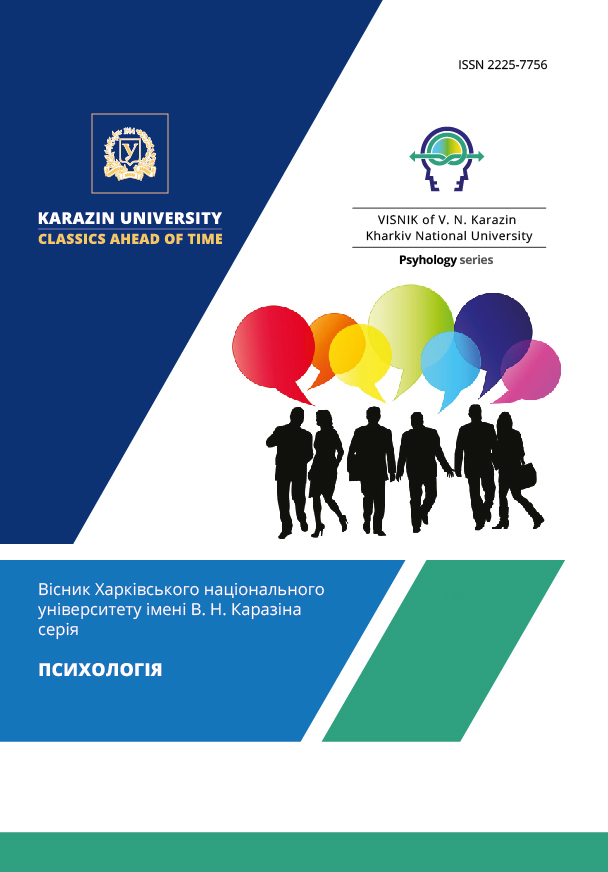Structural-Integrated 3D Model of a Teacher-Organizer Professional Identity in Conditions of Recreation Institution
Abstract
The article briefly outlines the scientific basis for the study of professional identity in historical and modern contexts and presents one aspect of the study of teachers - organizers professional identity in a recreational institution, namely the study of psychological characteristics of teachers - organizers professional identity at recreational institutions. The aim of the article is to clarify the structural features of the theoretical structural - holistic 3D model of a teacher - organizer professional identity at recreational institution, represented by integral - qualitative categories (reference professional image of a teacher - organizer, individual psychosemantic matrix, differential - psychological differential) and hierarchical levels: cognitive, associative, autonomous and integral. The empirical study was performed on the basis of the All-Ukrainian Children's Center "Young Guard" in the period from 2016 to 2021. A total of 214 people aged 19 to 35 took part. The subjects reflect the specifics of the professional community of teachers - organizers at a recreational institution. Certain structural elements of the model have a unique content and qualitative and quantitative indicators that reproduce the psychological features of the phenomenon of professional identity of a teacher-organizer at a recreation center. A unique feature of the model "spiral development" determines the development of a teacher - organizer professional identity in spiral and means that the processes and criteria embedded in the proposed model of professional identity develop in time and space simultaneously on several levels and with different quality.
Downloads
References
Bek, D., Cowan, Kr. (2010). Spiral dynamics. Driving values, leadership and change in the 21st century. M.: Otkrytyj Mir, Best Business Books, (in Russ.).
Erikson, E. Identity: youth and crisis. (1996). M.: Izdatel'skaya gruppa Progress. (in Russian).
Frankl, V.E. Psychotherapy in practice. (2001). Spb: Rech'. https://www.twirpx.com/file/2286643/(in Russian).
Kostiunina, O.V. (2017). Psychological structure of professional identity of a teacher - organizer of a recreational institution: structural - integrated 3D model and its applied embodiment. Rekreatsiina psykholohiia dytynstva: teoriia i praktyka. K.: «Tsentr uchbovoi literatury». http://dspace.pdpu.edu.ua/(in Ukrainian).
Kostiunina, E.V. (2016). Professional Identity of Recreational Institution Educators: New Research Opportunities. Nauka і оsvita, 9, 84 92. https://scienceandeducation.pdpu.edu.ua (in Russian)
Osipova, T.Yu. (2014). The problem of developing a professional position of the future teacher as a mentor. Nauka і osvіta, 1, 107 - 111. http://dspace.pdpu.edu.ua/(in Ukrainian).
Povarenkov, Yu.P. (2003) Psychological characteristics of professional identity. Krizis identichnosti i problemy stanovleniya grazhdanskogo obshchestva. YAroslavl': YAGPU. 154–163. (in Russian)
Sannikova, O. P. (2007). Formal dynamic and qualitative metacharacteristics of individuality. Nauka і osvіta, 6-7, 30-33. (in Russian).
Sannikova, O. P. (2013). Personality macrostructure: psychological description. Nauka i osvita. Tematychnyi spetsvypusk «Psykholohiia osobystosti: teoriia, dosvid, praktyka», 7, СХVІІ, 7-12. http://nbuv.gov.ua/UJRN/NiO_2013_7_3 (in Ukrainian).
Sergeeva, A. V. (2009). Psychological analysis of the formation of professional identity of future psychologists. Anan'evskie chteniya: Sovremennaya psihologiya: metodologiya, paradigmy, teorii: sbornik mat-lov mezhdunarodnoj nauchnoj konferencii. SPb: Piter, 448 – 450. (in Russian)
Sergeeva, A. V. (2013). Psychology of integral personality identity: monografіya. Odesa: Leradruk. (in Russian).
Shnejder, L. B. (2001). Professional identity: monografiya. M.: MOSU, http://psychlib.ru/mgppu/sh1/SH1-003-.HTM#$p3 (in Russian).
Shnejder, L.B. (2007). Personal, gender and professional identity: theory and diagnostic methods. M.: Moskovskij psihologo-social'nyj institut, https://www.twirpx.com/file/2209297/(in Russian).
Shubelka, N.V., Kostiunina, O.V. (2019). Practical tools for the professional activities of teachers of health and recreation in children's health and recreation facilities (from the experience of the State Enterprise "Ukrainian Children's Center «Moloda hvardiia»): navch. posib. Vyd. 2-he, pererobl. i dopov. Kyiv: Tsentr uchbovoi literatury. (in Ukrainian).
Simonenko, S. N., Grek, E. N., Kostyunina, E. V., Lezhenko, I. V. (2014). Recreational psychology of childhood: achievements and prospects. Nauka і osvіta, 12, 7-12. URL: http://nbuv.gov.ua/UJRN/NiO_2014_12_3 (in Russian).
Simonenko, S. N., Lebedinskij, E. B. (2011). Actual problems of recreational psychology of childhood. Nauka і osvіta, 11, 6-8. (in Russian).
Sinyakova, M.G., Shnejder, L.B. (2011). An empirical study of the characteristics and types of professional identity of urban teachers. Aktual'nye problemy psihologicheskogo znaniya, 1, 48-61. (in Russian).
Surova, E.E. (2005). Global epoch: polyphony of identity. SPb.: Izdatel'stvo «Osipov». https://pureportal.spbu.ru/ (in Russian).




